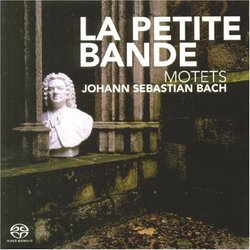| All Artists: Johann Sebastian Bach, Sigiswald Kuijken, La Petite Bande Title: Bach: Motets / Kuijken Members Wishing: 0 Total Copies: 0 Label: Challenge Classics Original Release Date: 1/1/2006 Re-Release Date: 11/14/2006 Album Type: Import, Hybrid SACD - DSD Genre: Classical Styles: Opera & Classical Vocal, Chamber Music, Historical Periods, Baroque (c.1600-1750), Classical (c.1770-1830) Number of Discs: 1 SwapaCD Credits: 1 UPC: 608917216028 |
Search - Johann Sebastian Bach, Sigiswald Kuijken, La Petite Bande :: Bach: Motets / Kuijken
 | Johann Sebastian Bach, Sigiswald Kuijken, La Petite Bande Bach: Motets / Kuijken Genre: Classical
Founded by Sigiswald Kuijken in 1972 to explore Baroque orchestral practice, La Petite Bande quickly established the performance standards for all who followed. Noted for their impeccable artistry, attention to detail, ... more » |
Larger Image |
CD Details
Synopsis
Album Description
Founded by Sigiswald Kuijken in 1972 to explore Baroque orchestral practice, La Petite Bande quickly established the performance standards for all who followed. Noted for their impeccable artistry, attention to detail, and refined stylish musicianship, La Petite Bande have impressed audiences and critics throughout the world with their "new" interpretations. The orchestra takes its name and constitution from Lully's own orchestra at the court of Louis XIV. All its members are internationally renowned specialists in the early music field. The German motets by J.S. Bach were written for specific occasions. They form part of the German a cappella tradition, in which the instruments play colla parte--that is, doubling the vocal parts. Bach's motets are among the high points of his output. We are told that when Mozart inspected the handwritten parts during his visit to Leipzig, he was moved to tears. Some historical research has suggested that Bach never had more than eight singers at his disposal, even for double-choir pieces, and so Sigiswald Kuijken has chosen to assign only one singer per part in this recording of the motets. Maestro Kuijken feels that the smaller vocal quartet greatly improves the clarity of the musical lines. Many recordings of the Bach motets include the four-part motet "Lobet den Herren, alle Heiden," but it has not been included here because Maestro Kuijken has serious doubts about its authorship.

 Track Listings (24) - Disc #1
Track Listings (24) - Disc #1